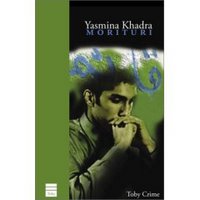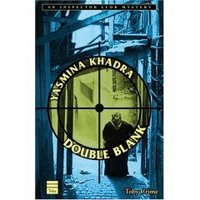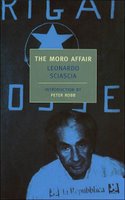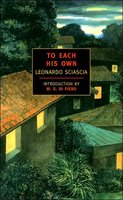
There have been many attempts to do a "literary" version of the crime novel/roman policier/noir fiction. Most of them fail as crime novels, because the literary concerns overwhelm the genre considerations. Yasmina Khadra's crime trilogy (Morituri, Double Blank, and Autumn of the Phantoms) is the rare case of writing that succeeds on both literary terms and the requirements of the crime novel. And in addition, this is the only (as far as I know) genuine contemporary Arabic policier or noir. Khadra is well-placed to perform this magic act. His character, Superintendent Brahim Llob, is both a copy and a writer, and his writing ultimately gets him in trouble (in a neat bit of postmodern metafiction) in the last novel. Khadra (the name is a pseudonym) was an army officer and a writer whose writing got him into trouble in spite of the false name, and he's now in exile in France (the novels were written in French).

The result is a dark glimpse of the nightmarish situation in a terror-torn Algeria of the 1990s, with fundamentalist murder squads roaming the streets (those squads provide the plot of the 2nd of the 3). There is also considerable corruption and decadence in the scene, and the combination of the two extremes catches Llob and the other (few) hones people in the novels in the middle. Llob, who has sent his family into the country away from the violence (at least possibly away from it), is a doomed figure, struggling (though not without his own violent impulses) against disorder and inhuman violence.

The last of the 3 novels has almost no plot (the first novel centers on a kidnapping, the second on a brutal series of murders). Llob is being persecuted by the police as well as his usual enemies among the decadent Westernized urban elite and the mostly faceless terrorist marauders. As he bounces through this horrific landscape, his few safe havens (literal and figurative) are stripped away and melancholy is the mood throughout. The lack of plot might be off-putting for someone who picked up Autumn of the Phantoms without first reading the other 2 in the series, but as a capstone to the trilogy, the indirect, disordered quality of the novel is perfect. The Llob novels are together a major accomplishment in the crime genre and in the literature of the post-colonial era.










